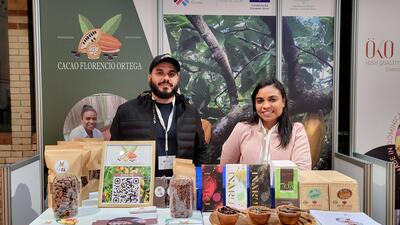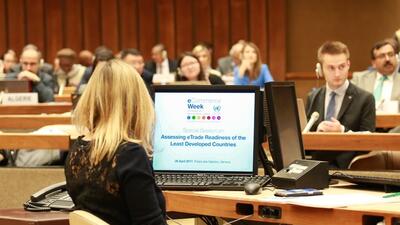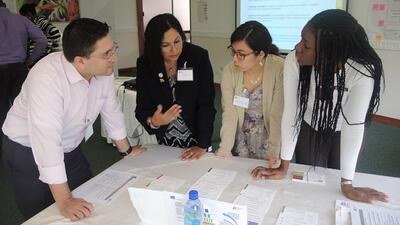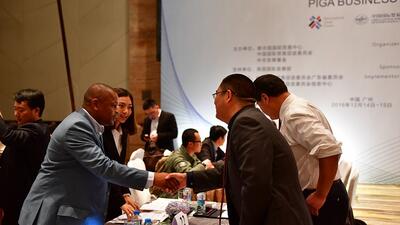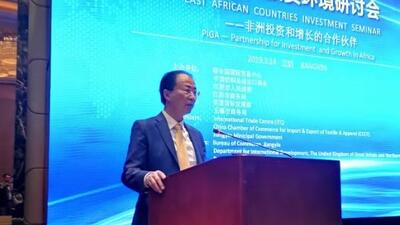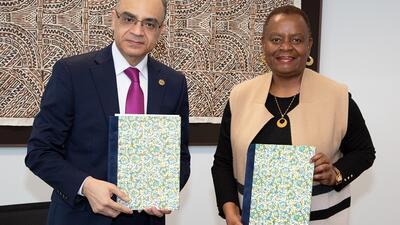WTO Eighth Ministerial Conference opens with emphasis on positive and warnings of dangers of stagnation (en)
The World Trade Organization (WTO)’s Eighth Ministerial Conference is highlighting Russia's accession anda ground-breaking deal that opens up government-procurement contracts worth as much as $100 billion to more foreign competition, as two significant and positive steps in the multilateral trading system. International Trade Centre (ITC) Executive Director Patricia R. Francis noted in her opening speech at the Ministerial that the multilateral system has kept intact its powers of attraction.
The three-day meeting in Geneva, which began on 15 December, began with leaders saying the only way forward on the Doha Development Agenda is a change in the way negotiations are conducted. WTO Director-General Pascal Lamy urged major governments to show leadership, muster the political courage to act together to open trade and to make the interests and needs of poor countries their top priority.
"I don't think we can any longer bury our head in the sand," Mr. Lamy
told ministers at the opening session. "We need to understand the root
causes" for not getting a deal. "How do we move forward? This should
be done step by step, gradually moving forward parts of the DDA that have been
agreed and finding solutions to the parts where differences remain."
The decade-old Doha talks have snagged as industrialized countries demand more
access to markets in developing nations and amid disagreements about protection
for farmers in wealthy economies. While no Doha negotiations will take place at
the meeting, ministers have discussed the trade round, which will be put off
until 2013, after the U.S. presidential election.
The chairman of the WTO's General Council plans to issue a document asking
ministers to provide "political guidance" on the Doha round, the
multilateral trading system and the WTO, and trade and development.
"By popular opinion, there is a lack of political will to move the
multilateral trading system forward," ITC Executive Director Patricia
Francis said at the opening session. "Yet as the world is changing at an
ever-increasing speed, the dynamics necessitate a new way of responding to
alleviate mistrust and to build consensus on trade policy initiatives which
deliver results for our development objectives."
The Doha round has provided significant contributions to the trade and development agenda, said ITC Executive Director Patricia R. Francis in her opening speech at the World Trade Organization (WTO)’s Eighth Ministerial Conference. Ms. Francis noted that Aid for Trade now accounts for about a third of global aid commitments that include the WTO initiative of the Enhanced Integrated Framework for least-developed countries.
"While
the International Trade Centre certainly does not cover the full spectrum of
the aid for trade agenda, we have been the force pushing for the inclusion of
the voice of the private sector and women in the debate," she said.
Anabel Gonzalez, Costa Rica's Minister of Foreign Trade, said during the plenary session on 16 December that a pragmatic approach is needed. The WTO should move ahead in areas that benefit all members, such as trade facilitation, and examine other ways to make progress, including a plurilateral approach.
Ministers also warned that as economies stumble amid Europe's sovereign-debt crisis, the global outlook is leading to a rise in protectionism. A group of 20 developing nations issued a statement expressing "serious concern over the increase of protectionism in agricultural trade." Chinese Commerce Minister Chen Deming said he expects "trends towards protectionism were expected to grow in 2012."
The bright points of the conference, ministers said, is that the WTO will welcome
three new members -- Russia, Samoa and Montenegro -- and the successful
conclusion of a revised Government Procurement Agreement on 15 December. ITC has provided assistance to Samoa during
its accession process, and Ms. Francis will speak during the accession
ceremony.
“Even in a very difficult and deteriorating macro-economic environment, with a bit of will, plus goodwill and hard work, things can get done,” Mr. Lamy told a news conference.




